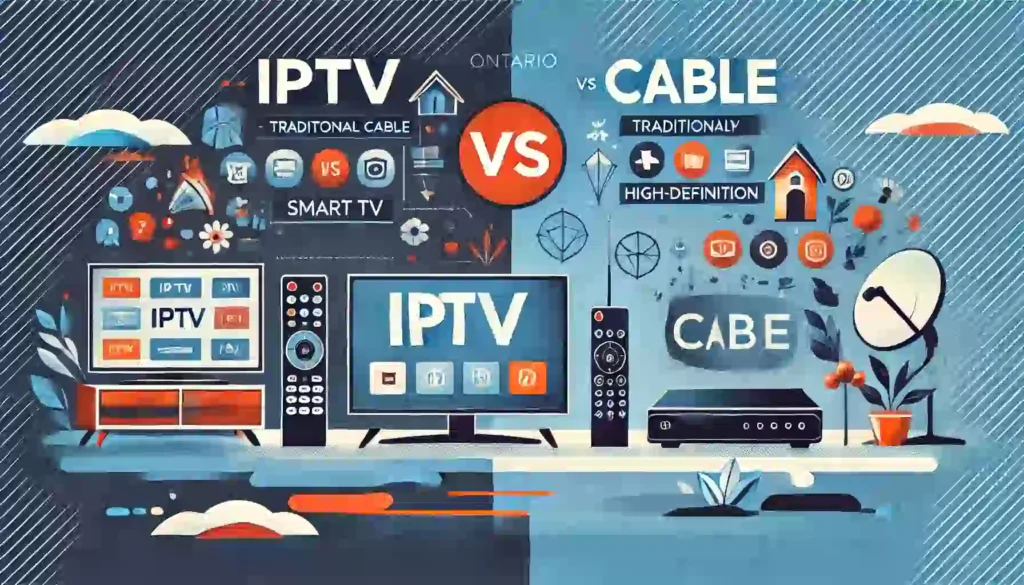
If you live in Ontario and are considering switching from traditional cable TV to IPTV (Internet Protocol Television), you’re not alone. More and more Ontarians are making the move to IPTV for various reasons, but is it really better than cable? In this blog, we’ll break down the key differences between IPTV and traditional cable to help you decide which is the best option for you.
1. Cost Comparison
One of the main reasons people switch to IPTV is the potential for lower costs. Traditional cable packages often come with extra fees for equipment, installation, and long-term contracts. In contrast, IPTV services offer flexible pricing, often at a fraction of the cost. With IPTV, you can typically choose between monthly or yearly subscriptions, and you avoid many of the hidden fees associated with cable.
IPTV: More affordable, flexible pricing, no long-term contracts.
Cable: More expensive, additional fees for equipment and installation.
2. Channel Selection
Both IPTV and traditional cable offer a wide range of channels, but IPTV often has the edge when it comes to international and specialty channels. IPTV providers in Ontario typically offer more customizable packages, allowing you to choose the channels you actually want to watch rather than paying for hundreds of channels you never use.
IPTV: More international and customizable channel options.
Cable: Standard channel lineups, often with unwanted extras.
3. Content On-Demand
One of IPTV’s greatest advantages over traditional cable is its focus on on-demand content. With IPTV, you can watch live TV as well as access vast libraries of movies, shows, and sports events at your convenience. Traditional cable offers some on-demand content but is typically more limited.
IPTV: Extensive on-demand content.
Cable: Limited on-demand content, often requires additional charges.
4. Streaming Quality
Both IPTV and cable offer HD and 4K streaming options, but IPTV is more reliant on your internet connection. If you have a high-speed connection in Ontario, IPTV can deliver crisp, clear video quality. On the other hand, cable TV is more stable as it doesn’t depend on internet bandwidth. If your internet speed fluctuates or you experience outages, IPTV streaming quality may suffer.
IPTV: Excellent quality with a good internet connection.
Cable: Consistent video quality regardless of internet speed.
5. Ease of Use and Setup
Traditional cable typically requires professional installation, whereas IPTV can be set up quickly and easily by the user. Most IPTV services work through apps that are compatible with Smart TVs, Android boxes, and streaming devices like the Amazon Fire Stick, meaning you can get started almost instantly.
IPTV: Easy setup, no installation required.
Cable: Requires installation by a technician.
6. Flexibility
IPTV provides the flexibility to watch your favorite shows on any device, whether it’s your smartphone, tablet, or Smart TV. You’re not restricted to watching content only on your television, which is a huge benefit for people who want to take their entertainment on the go. Traditional cable, on the other hand, is usually tied to your TV set.
IPTV: Watch anywhere, on multiple devices.
Cable: Limited to your TV.
7. Legal Considerations
It’s important to choose a legitimate IPTV provider to avoid legal issues. While there are many authorized IPTV services in Ontario, some services operate in a grey area, offering pirated content. In contrast, traditional cable providers are fully regulated, so you won’t run into legal troubles.
IPTV: Be cautious—choose a legitimate provider.
Cable: Fully legal and regulated.
Final Verdict: Which is Better for You?
Ultimately, the decision between IPTV and traditional cable in Ontario depends on your personal needs and preferences.
- Choose IPTV if: You want lower costs, more flexible channel options, on-demand content, and the ability to watch on multiple devices.
- Choose Cable if: You prefer a stable, internet-independent service and don’t mind paying extra for installation and equipment.
As technology evolves, IPTV is becoming a popular alternative to cable for many Ontarians, offering greater flexibility and cost savings. However, if you’re someone who prefers a more traditional, hassle-free experience without relying on internet speed, cable may still be the better choice.
Regardless of your choice, make sure to assess your needs carefully and choose a service that aligns with your entertainment habits!
